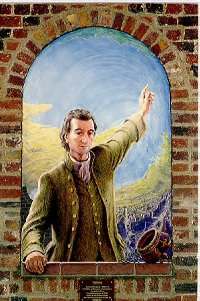See Dissecting Deism Past and Present
Quick Overview of the Enlightenment
Hurdles to the German Enlightenment
Germany didn't become a unified state until 1871. There were few German newspapers, the literary language was Latin, and the population was much less literate. There was no strong class rift as in France. All of this stifled the advancement of Enlightenment ideas.
The Aufklarung
King Frederick the Great of Prussia introduced some Enlightenment ideas from other parts of Europe, a small German Enlightenment (Aufklarung) began, diverged in a very different direction from the English or French. The Germans never attacked religion as say France did, the Aufklarung produced a more mystical view of the world, some writers combining reason with religion.
Major figures
Gottfried Wilhelm Leibniz (1646-1716), "was very religious and in fact saw monads as reflections of a structured, harmonious universe-the work of a perfect God." He paved the way for the mysticism of the rest of the German Enlightenment.
Immanuel Kant (1724-1804) founded an entire school of thought. He released the Critique of Pure Reason (1781). Critique proposes that all people are born with an inborn sense of raw experience-a phenomenon that Kant dubbed transcendental idealism. He elevated skepticism. (Mistrust of empiricism or "perceptions and observations in the world cannot be trusted.") Kant effectively disagreed with the premise of the entire French Enlightenment.
Kant also tried to define morality, in Groundwork for the Metaphysics of Morals (1785). He argues that reason must be the sole basis for moral action. Rather, the morality of an action depends on the motivation for the action. "An individual arrives at the conclusion that a certain action is right and pursues that course of action as a result, then that behavior is moral." In other words, moral relativism. He influenced Hegel, Marx, and Nietzsche.
Johann Wolfgang von Goethe (1749-1832) is considered the most prominent figure in Germany's Sturm und Drang ("storm and stress") movement, a roughly twenty-year period from the 1760s to 1780s in which young German intellectuals, inspired by Rousseau's emphasis on emotion, revolted against optimism and reason and plunged into darker, more anarchic themes.
Goethe was never terribly concerned with the politics of his era, even amid the massive governmental shifts that were taking place in Germany at the time. Just like Rousseau's works in France, Goethe's works focused on emotions and innate human feelings, signaling the end of the German Enlightenment, which flowed right into the Romantic movement that was burgeoning throughout Europe.
Ref. http://www.sparknotes.com/history/european/enlightenment/section5.rhtml
Causes
The growth of science (Kepler, Galileo), exposure to other cultures, and centuries misrule of by monarchies, the 30 Years War, and the bubonic plague shattered medieval culture. Aristotle fell to Rene Descartes and Francis Bacon, who revised the scientific method, setting the stage for Isaac Newton. Because of this, science fell into conflict with the religious community.
The Enlightenment in England
The first major Enlightenment figure in England was Thomas Hobbes, who caused great controversy with the release of his provocative treatise Leviathan (1651). Taking a sociological perspective, Hobbes felt that by nature, people were self-serving and preoccupied with the gathering of a limited number of resources. To keep balance, Hobbes continued, it was essential to have a single intimidating ruler. A half century later, John Locke came into the picture, promoting the opposite type of government-a representative government-in his Two Treatises of Government (1690).
Although Hobbes would be more influential among his contemporaries, it was clear that Locke's message was closer to the English people's hearts and minds. Just before the turn of the century, in 1688, English Protestants helped overthrow the Catholic king James II and installed the Protestant monarchs William and Mary. In the aftermath of this Glorious Revolution, the English government ratified a new Bill of Rights that granted more personal freedoms.
See JOHN LOCKE ON REASON AND FAITH
The Enlightenment in France
Many of the major French Enlightenment thinkers, or philosophes, were born in the years after the Glorious Revolution, so France's Enlightenment came a bit later, in the mid-1700s. The philosophes, though varying in style and area of particular concern, generally emphasized the power of reason and sought to discover the natural laws governing human society.
The Baron de Montesquieu tackled politics by elaborating upon Locke's work, solidifying concepts such as the separation of power by means of divisions in government. Voltaire took a more caustic approach, choosing to incite social and political change by means of satire and criticism. Although Voltaire's satires arguably sparked little in the way of concrete change, Voltaire nevertheless was adept at exposing injustices and appealed to a wide range of readers. His short novel Candide is regarded as one of the seminal works in history.
Denis Diderot, unlike Montesquieu and Voltaire, had no revolutionary aspirations; he was interested merely in collecting as much knowledge as possible for his mammoth Encyclopedie. The Encyclopedie, which ultimately weighed in at thirty-five volumes, would go on to spread Enlightenment knowledge to other countries around the world.
Romanticism
In reaction to the rather empirical philosophies of Voltaire and others, Jean-Jacques Rousseau wrote The Social Contract (1762), a work championing a form of government based on small, direct democracy that directly reflects the will of the population. Later, at the end of his career, he would write Confessions, a deeply personal reflection on his life. The unprecedented intimate perspective that Rousseau provided contributed to a burgeoning Romantic era that would be defined by an emphasis on emotion and instinct instead of reason.
Skepticism
Another undercurrent that threatened the prevailing principles of the Enlightenment was skepticism. Skeptics questioned whether human society could really be perfected through the use of reason and denied the ability of rational thought to reveal universal truths. Their philosophies revolved around the idea that the perceived world is relative to the beholder and, as such, no one can be sure whether any truths actually exist.
Immanuel Kant, working in Germany during the late eighteenth century, took skepticism to its greatest lengths, arguing that man could truly know neither observed objects nor metaphysical concepts; rather, the experience of such things depends upon the psyche of the observer, thus rendering universal truths impossible. The theories of Kant, along with those of other skeptics such as David Hume, were influential enough to change the nature of European thought and effectively end the Enlightenment.
The End of the Enlightenment
Ultimately, the Enlightenment fell victim to competing ideas from several sources. Romanticism was more appealing to less-educated common folk and pulled them away from the empirical, scientific ideas of earlier Enlightenment philosophers. Similarly, the theories of skepticism came into direct conflict with the reason-based assertions of the Enlightenment and gained a following of their own.
What ultimately and abruptly killed the Enlightenment, however, was the French Revolution. Begun with the best intentions by French citizens inspired by Enlightenment thought, the revolution attempted to implement orderly representative assemblies but quickly degraded into chaos and violence. Many people cited the Enlightenment-induced breakdown of norms as the root cause of the instability and saw the violence as proof that the masses could not be trusted to govern themselves. Nonetheless, the discoveries and theories of the Enlightenment philosophers continued to influence Western society for centuries.
Ref. http://www.sparknotes.com/history/european/enlightenment/summary.html
- Islam Versus Deism
- Left vs Right, Montesquieu, Corporatism
- Eastern Roman Empire and Islam
- Philosophies of Islam, Greece, and the West by Turgut Ozal
- Example of Islam and science.
- Maimonides Versus Aristotle and the Jews of Spain, Thirteen Rules
- Handbook on the History of Modern Science
- Pelagius and why he was right
- Islam Versus Judaism and Christianity
- Islam to Deism: Why I became a Deist
Web site Copyright Lewis Loflin, All rights reserved.
If using this material on another site, please provide a link back to my site.

